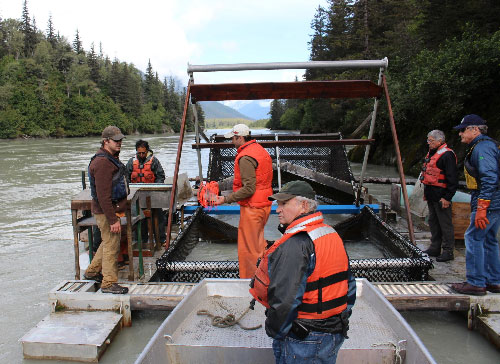
Alaska and BC Discuss Transboundary Waters
August 27 2015
Lt. Governor Byron Mallott invited BC Minister of Energy and Mines, William Bennett, to come to Southeast Alaska and meet the people whose lives depend on the transboundary rivers for their way of life... Bennett was flown up the Taku with the Alaska Department of Fish and Game and saw the shuttered Canadian Tulsequah Chief Mine as well as went on the river, stopping at a fish wheel escapement camp and a commercial fish buying station, to understand the salmon journey up the river.
Lt. Governor Byron Mallott and BC Minister of Energy and Mines William Bennett with the Alaska Department of Fish and Game on on the Taku, stopping at a fish wheel escapement camp.
The BC delegation, including high-ranking mining and environmental regulators, held candid discussions with their Alaska counterparts from Governor Walker’s Transboundary Working Group headed by Mallott, including the Commissioners of the Dept. of Environmental Conservation, Fish and Game, and Department of Resources, on how to create a framework for further discussions and improvements in specific areas including: Collaboration on Monitoring: both sides recognize the importance of having a reliable and adequate process for the collection and distribution of baseline, regional and project-specific water quality and related data. There are opportunities to collaborate among different agencies, Tribes, First Nations, Industry and others to collect the data. Alaska Participation in the Environmental Assessment and Permitting Processes: Both sides are looking for opportunities to build on the existing collaboration whereby members of Alaska’s Large Mine Review Team (technical experts from the state’s departments of Natural Resources, Fish and Game and Environmental Conservation) participate in the Environmental Assessment and Permitting Processes relating to province’s authorization of the development of transboundary mines. The issue of financial assurances during and after the life of the mine by governments and industry was also broached by stakeholders. Both recognized the constraints that contracting budgets puts on them and the need to prioritize work, build on existing collaborations, leverage existing partnerships and resources, and avoid unnecessary duplication. They are also looking for opportunities for interested Alaskans, including tribes and NGOs, to have easier access to information about potential mining projects in BC and to have meaningful opportunities to provide input before decisions are made. It is envisioned this will include the holding of public open houses in Alaska during the Environmental Assessment process on particular proposed projects. In the past, much of the collaboration between the Alaska and BC relating to transboundary mines has been during the Environmental Assessment and Permitting processes. In addition to enhancing Alaska participation in these processes, the parties intend to look at useful means to share information and concerns relating to each stage of a mine’s life, specifically the permitting, operational, shutdown, closure and reclamation phases. A key goal is early involvement and transparency in all aspects with tribes, First Nations, stakeholders and the public. Thursday, Mallott and Bennett were in Ketchikan to meet with additional stakeholders and tribes before attending the Ketchikan Chamber of Commerce luncheon. Other delegation members will visit Greens Creek Mine as the guests of Hecla Mining Company before returning to Canada. Of the meeting in Juneau Wednesday, Dale Kelley, executive director of the Alaska Trollers Association said, “The meeting was a productive first step and we’re grateful for the opportunity to meet with Minister Bennett and Alaska Lt. Governor Mallott. While cross-border cooperation is essential for protecting fisheries, it involves more than provincial and state agreements regarding the sharing of data and perspectives. Fishermen want commitments regarding the watersheds that impact our fisheries to be backed up by the full force of the U.S. government and Crown because that offers the greatest chance that they will be binding and upheld over time." B.C. is moving forward with an aggressive program of mine development in the transboundary region bordering Southeast Alaska, projects that threaten clean water, wild salmon, tourism, indigenous communities and Alaska’s unique way of life. Thousands of Alaskans have requested that the International Joint Commission, created under the Boundary Waters Treaty, examine potential risks to Alaska posed by the multitude of mine developments in B.C.
Edited by Mary Kauffman, SitNews
Sources of News:
|
||
